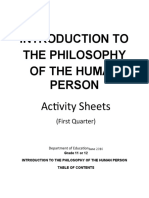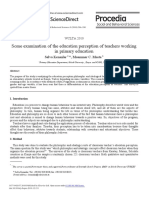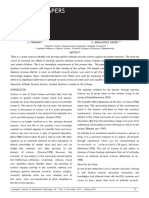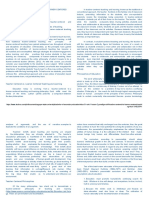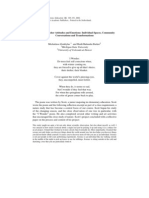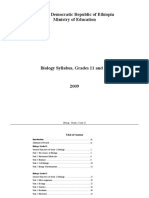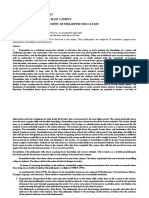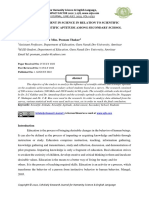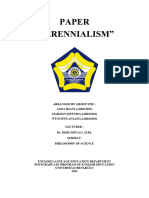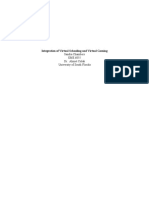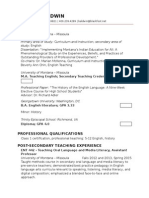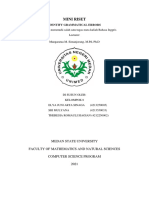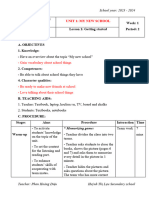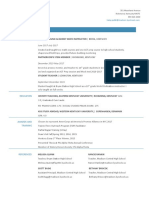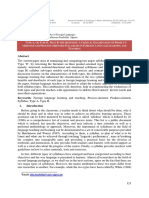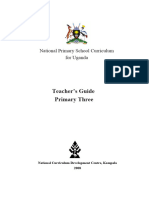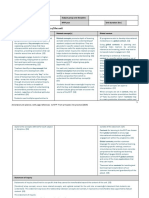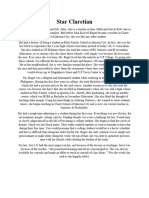This article was downloaded by: [Monash University Library]On: 03 August 2011, At: 18:25Publisher: RoutledgeInforma Ltd Registered in England and Wales Registered Number:1072954 Registered office: Mortimer House, 37-41 Mortimer Street,London W1T 3JH, UK
Scandinavian Journal of Educational Research
Publication details, including instructions forauthors and subscription information:http://www.tandfonline.com/loi/csje20
Sigrun Gudmundsdottir
a
& Lee Shulman
ba
Sigrun Gudmundsdottir, doctoral student,Stanford University School of Education,California
b
Lee Shulman, Professor, Stanford UniversitySchool of Education, Stanford, CA 94305,CaliforniaAvailable online: 07 Jul 2006
To cite this article:
Sigrun Gudmundsdottir & Lee Shulman (1987): PedagogicalContent Knowledge in Social Studies, Scandinavian Journal of EducationalResearch, 31:2, 59-70
To link to this article:
http://dx.doi.org/10.1080/0031383870310201
PLEASE SCROLL DOWN FOR ARTICLEFull terms and conditions of use: http://www.tandfonline.com/page/terms-and-conditionsThis article may be used for research, teaching and private studypurposes. Any substantial or systematic reproduction, re-distribution, re-selling, loan, sub-licensing, systematic supply or distribution in any formto anyone is expressly forbidden.

The publisher does not give any warranty express or implied or make anyrepresentation that the contents will be complete or accurate or up todate. The accuracy of any instructions, formulae and drug doses shouldbe independently verified with primary sources. The publisher shall notbe liable for any loss, actions, claims, proceedings, demand or costs ordamages whatsoever or howsoever caused arising directly or indirectly inconnection with or arising out of the use of this material.
D o w n l o a d e d b y [ M o n a s h U n i v e r s i t y L i b r a r y ] a t 1 8 : 2 5 0 3 A u g u s t 2 0 1 1
Pedagogical Content Knowledge in Social Studies
SIGRUN GUDMUNDSDOTTIR LEE SHULMAN
Abstract:
Gudmundsdottir, S. Shulman, L. 1987. Pedagogical Content Knowledgein Social Studies.
Scandinavian Journal of Educational
Research
31,
59-70. The roleof teacher's pedagogical content knowledge in social studies is addressed through twocase studies: a novice and a veteran teacher. We demonstrate that the importantdifference between the novice and the expert is manifested in a special kind ofknowledge that is neither content nor pedagogy
per se.
It rests instead in pedagogicalcontent knowledge, a form of teacher understanding that combines content, pedagogyand learner characteristics in a unique way.
Sigrun Gudmundsdottir, doctoral student, Stanford University School of Education,California.Lee Shulman, Professor, Stanford
University
School of Education, California. Address:Stanford, CA 94305.
INTRODUCTIONWhat do expert teachers know about theirsubject matter that novice teachers donot? We approach this question by con-trasting the pedagogical content knowl-edge of two social studies teachers, a vet-eran teacher and a novice. Previously,our work in the
Growth of Knowledge inTeaching
project has focused on noviceteachers.
1
Veteran teachers have been thesubject of two doctoral dissertationsrelated to the
Growth of Knowledge inTeaching
project (Hasweh 1985; Gud-mundsdottir in progress). The presentstudy is the first time we attempt a com-parison of expert and novice teachersusing our theoretical framework as aguide.The two teachers teach social studiesin high schools in the San Francisco Bayarea. Harry is a veteran teacher who hasbeen teaching for thirty-seven years.
2
While he is a historian with expertise inthe American Revolution, he has taughta range of subjects within social studies.This study focuses on him teaching UShistory to juniors.Chris, the novice teacher, is in a teachereducation program learning to becomea social studies teacher. He teaches onefreshmen's class in world studies. Herecently graduated in anthropology from aprivate university in Northern California.Chris's expertise within anthropology iscultural anthropology and human evol-ution. While both Harry and Chris arefine scholars in their field, there is a fun-damental difference in their commandover their subject matter for teaching, orwhat we call pedagogical content knowl-edge. We are interested in the ways inwhich the expert teacher knows his sub-ject matter and can do things in the class-room that the novice teacher cannot do.We are especially interested in this ques-tion from the perspective of the subjectmatter they are teaching.THEORETICAL FRAMEWORKThe comparison between the expert andnovice is based on a Model of PedagogicalReasoning proposed by L. Shulman(1986). This model suggests that in pre-
D o w n l o a d e d b y [ M o n a s h U n i v e r s i t y L i b r a r y ] a t 1 8 : 2 5 0 3 A u g u s t 2 0 1 1
60
Sigrun Gudmundsdottir Lee Shulman
paration and teaching, teachers draw onsources of knowledge which are ident-ified: content knowledge, pedagogicalcontent knowledge, curricular knowl-edge, general pedagogical knowledge,knowledge of aims and purposes, knowl-edge of learners, and knowledge of edu-cational contexts, settings and govern-ance. Shulman suggests that these sourcesof understanding make possible the pro-cess of pedagogical reasoning and action.The model describes how a teacher'sunderstanding of subject matter is trans-formed to make it 'teachable'. This pro-cess of transformation taps the differentsources of knowledge, the most importantbeing pedagogical content knowledge. Itis this way of knowing and understandingthe subject matter that distinguishes theteacher from the subject matter specialist.We suggest that pedagogical contentknowledge is both built with and buildsupon content knowledge, general peda-gogical knowledge, and knowledge oflearners. It is not unreasonable to assumethat pedagogical content knowledgeshould draw on this kind of knowledge,since college graduates who want tobecome high school teachers are requiredto have a bachelor degree in a subject,and take courses on teaching methods andtheories of learning.There are three clearly defined areasin pedagogical content knowledge, eachinfluenced by one type of knowledge, yetqualitatively different from the sources.There is pedagogical content knowledgethat is influenced by content knowledge.Grossman, Reynolds, Ringstaff Sykes(1985) report that the student teachersthey worked with shifted their orientationto the subject matter as a result of teachingexperiences. Gudmundsdottir, Carey Wilson (1985) observed that studentteachers modelled the courses they wereteaching after their content knowledge.Pedagogical content knowledge that isinfluenced by content knowledge includesknowledge of the central topics, concepts,and areas of the subject matter that canbe and are taught to students. Forexample, in mathematics, teachers knowthat students must learn addition, mul-tiplication and substration and so on. Insocial studies students learn the history oftheir own country before they learn worldhistory. Content knowledge is requiredfor knowledge and understanding of theorder which concepts, topics or areaswithin a subject can be, and are beingtaught, and the advantages and dis-advantages of each approach. Also,knowledge of analogies, similes, examplesand metaphors by which to explain thesubject matter to students requires con-tent knowledge.The term curriculum potential wasintroduced by Ben-Peretz (1975). Itfocuses on a long known fact, namely,that curriculum materials are far morecomplex and richer in ideas than devel-opers intended. Ben-Peretz suggests thatthere are other activities and ideas con-tained within a given curriculum material,be it broad guidelines or a textbook, thanthe curriculum makers explicitly state.The Pedagogical Reasoning Modelassumes that content knowledge is influ-ential in realizing curriculum potential.Research on innovation shows that teach-ers realize the potential of the curriculathey teach since almost all teachers changeit (Berman McLaughlin 1975). Ben-Peretz suggests that several factors deter-mine the potential of curricula: contentknowledge, understanding the philosophyof the curriculum, curriculum devel-opment experience, feeling for classroomreality, knowledge of learners and open-ness to new ideas.Knowing the different ways topics canbe taught, and the pros and cons of each
D o w n l o a d e d b y [ M o n a s h U n i v e r s i t y L i b r a r y ] a t 1 8 : 2 5 0 3 A u g u s t 2 0 1 1




